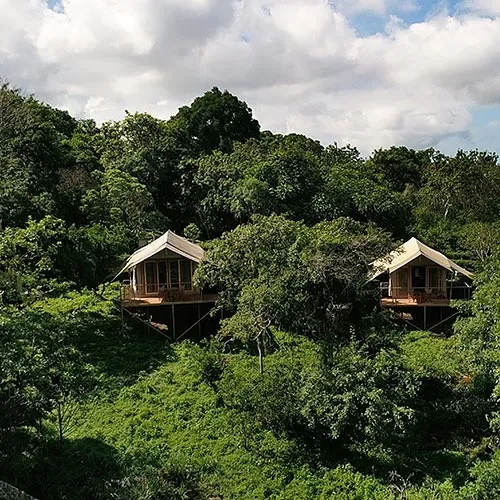As part of our Family Safari, guests spend a festive day with a local fisherman learning the tricks of the trade while exploring the sea and discovering her creatures. This trip is part of a program with the Galapagos National Park, which gives fishermen an alternative means to support themselves and reduces the strain caused by overfishing.
Leaving early, the crew sets its sights on the day’s best bet for a successful catch; traveling by motorboat to in-the-know spots. Once there, passengers are given a hands-on lesson in the traditional fishing methods used in the Galapagos, and then try their hand at catching dinner. The park asks that participants only take what they will use, and require the release of picudo, marlin or sailfish, if caught.
Supporting the local community is a major part of the philosophy behind our safari tours, a way to give back using the resources available. There are about 200 fishermen on Santa Cruz who depend on their trade for a living. The damage caused by overfishing limits the potential for sustainable growth. This change has been hard to overcome, reducing the possibility of earning a living to levels dwarfed by the money brought in by tourism.
The experimental fishing program is responsible tourism in action, giving those who need it a chance to use their livelihood towards a stronger hold in the tourism industry. The initiative offers year-round work in place of short fishing seasons, an enlightened alternative that can exceed the annual income earned from fishing with the current restrictions in place.
As conservation is of the upmost importance in the Galapagos, this trip puts guests on the forefront of innovative, sustainable practices that make a real difference. Throughout the day, explorers experience the complicated balance between making a living in the Galapagos and protecting the delicate ecosystem that make the islands special.
A stop at a secluded beach is a highlight of the journey, landing at nearby spots for snorkeling or a walk along the shores. Away from the throngs of tours on other parts of the islands; this is a chance to experience the exotic beauty of the Galapagos, a step back to the days when people were in short supply.
The Galapagos Marine Reserve encompasses a vast, underwater ecosystem that is home to almost 3000 species of fish. Overfishing has changed the natural dynamics of the food chain in the ocean and drastically reduced fish populations, including those of the sea cucumber and spiny lobster.
To counter this and repopulate the reserve’s fish populations, strict regulations and quotas are in effect. Artisanal fishing is allowed without nets, which endanger the other inhabitants of the reserve. Seasons for specific species are dictated by the park, which monitors the fisheries and adjusts its management and limits each year.
The national park has issued permits to 48 experiential fishing boats in the islands. Our guests find that the experience is a highlight of their time at the camp, the whole family disembarking with a renewed appreciation for the diversity of the marine reserve and a new respect for the people who live on its shores.
For more information on this rare look into grassroots conservation in action as well as the other sights and activities that are part of a Galapagos Family Safari, contact us by phone or through this website.
